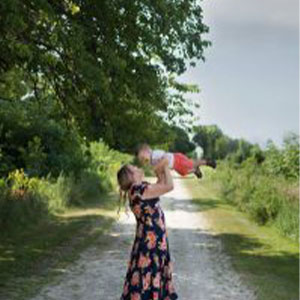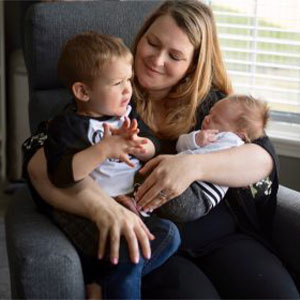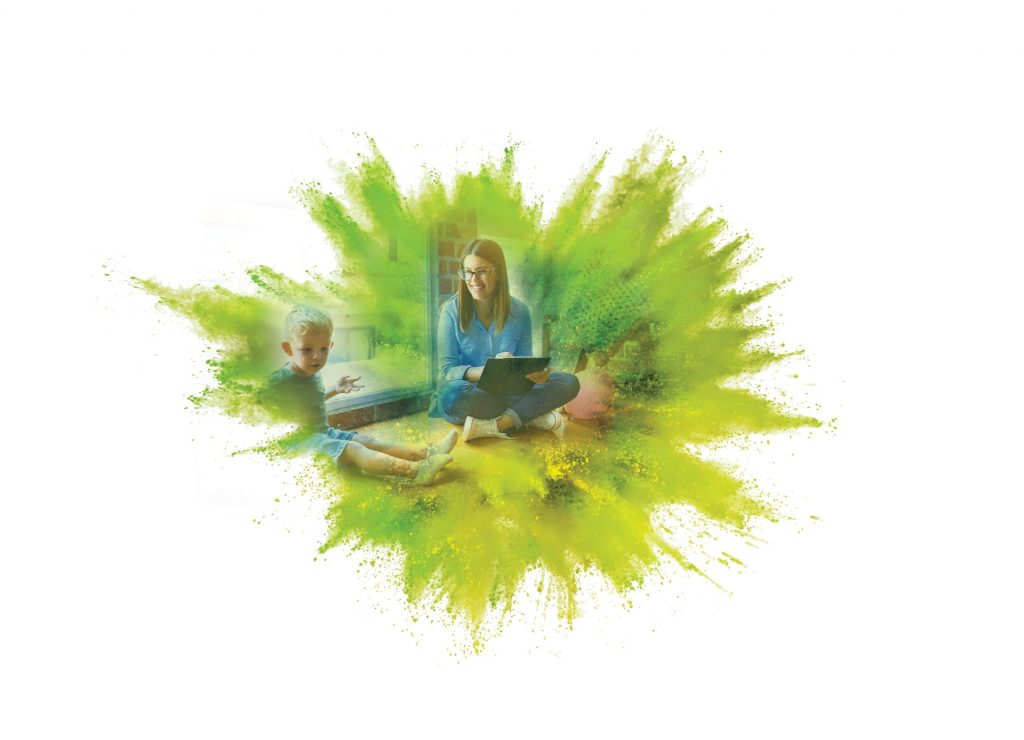
by Jessie Cooper | Dec 17, 2020
As fall comes to an end I’m sitting on the farm surrounded by freshly fallen snow. It’s as though the universe is painting a visual for this season of life. These past few months have been extremely difficult for me. In the middle of a growing pandemic and the pressing matter of racial inequality, I know I’m not alone. Collectively as a nation and world, we’ve had to adapt overnight to changes in our culture, find ways to address what seems like trauma after trauma, and somehow keep putting one foot in front of the other. Yet life is still around us, no matter the valley we’re in.
As a business owner of a company that makes my heart swell with pride, there are so many things I want to tell you. I want to tell you about the years before Instructional ABA Consultants was born–what it was like to hold the hands of mothers whose children were being institutionalized. I want to tell you how Applied Behavior Analysis changed everything for each and every client I worked with. Of my deep love of a man named David, my favorite client of all times.
I want to explain how through tears, sweat, heartache, brilliance, vulnerability, and grit my company was shaped; this came from me and the employees who built it. I want to create resource after resource for children with autism, families of these young children, and each person in the world who feels like their voice doesn’t matter. All of these things burn inside my heart.
Yet today, my win was that I got up without crying. Was this anyone else’s win?
Taking Time After Trauma
In the middle of trauma or in coming out of trauma it’s easy to expect ourselves to quickly go “back to normal.” I remember this vividly when I was awakening from postpartum depression after Henry was born. I was so joyful to feel like myself again. I wanted to pack my days with everything “Jessie” I could think of. Doing this, while very tempting, would have flattened me. In coming out of a depression I had to honor what my body and mind had been through. To choose wisely what I would add to each day.
So what is normal and how do we choose what to add? Today we’re all so indicated by social media and marketing telling us what our lives should look like. On top of that, we’re socially conditioned to be a certain way or want certain things based on our gender, race, sex, and age. There are so many opinions swirling around us on who we should be and how we should behave. Trauma, like the COVID-19 pandemic, threatens this unnatural order.
Many of us were on autopilot prior to COVID-19. Then we were forced to stop. I believe this is true with any trauma or major life event. It could be a cancer diagnosis, the loss of a loved one, an injustice toward a loved one, a divorce, your own mental health taking an unexpected turn, financial upset–the list goes on and on. Trauma is part of our lives and it’s the part of our lives we don’t talk about enough.
The scariest part? If a person does speak up about their own personal traumas, the systems supporting us or the people around us often bring shame. Shame to keep us small and silent. If you feel pain, scared, or threatened don’t ever let anyone tell you to stay quiet. Speak up every single time regardless of what others say around you.
What We Can Do to Recover
So what can we do? What can I do as 2020 comes to a close and the pandemic we thought would be over by June continues? Wasn’t it just yesterday I was laughing about toilet paper and schools closing over margaritas with friends? We honor the season then get the hell out when it’s time to get out. That’s what we do.
Winter comes every year and our busy-ness becomes harder to keep. COVID took much of that busy-ness already. Personally, I hope it never comes back. This season of stillness is a natural order of things. We as humans are not meant to be on high speed every second of every day. We are also not built to impress and conform. We’re built to breathe freely, live freely, and love fully.
To do this we must honor where we are in life and love ourselves just as much when we’re crying on the bathroom floor as we do when we’ve achieved a goal. Grief comes for all of us. When we can offer ourselves compassion and grace the season is honored. On the other side of winter is spring where the flowers grow. Yet if we spend our lives wishing for beautiful flowers we’ll miss the cold beauty of a bare tree.
A new season is coming. Sit here darling ones. Hold your heart if you’re crying and take a moment to breathe the sweet winter air.
Xoxo,
Jessie

by Jessie Cooper | Jan 29, 2020
To me, young children are among the world’s greatest gifts. Given the chance, every single child can flourish. Before children, I found my way into the world of therapy through research and my work. In all honesty, I was curious about this world, as I have two very loving parents but even my childhood was not without struggle. I needed to understand how my environment shaped me and in turn how the environment shapes all children. I have come to believe through my work, research, and own short story as a mama, that environment is everything. What I’ve also come to know is the exhaustion of trying to create a perfect environment for my own children.
The Environment and Postpartum Depression
As I’ve disclosed before, after the birth of my son Henry I suffered from postpartum depression. There were several factors that contributed to this. While it was a chemical reaction that caused my depression (due to PTSD), my fear of creating a perfect environment for my child fueled it. I wanted so dearly and desperately to create a world for Henry where he was always welcome to be his best self. In the heart of a well-woman, this goal is beautiful; when I was sick this goal was obsessive. I know too many other mamas still trying to climb over this hill today. As someone who loves research and “knowing,” I thought through my knowledge I could create the perfect environment. To me this looked like constant engagement, setting up learning and language every chance I could, cooking organically (OK, I still love this one!), pushing bilingualism (my husband is Bulgarian), avoiding screen time and being present all the time. Well, after healing from my bout with postpartum depression I still struggled with perfectionism. I wanted to be perfect so Henry could always be his best self. I wouldn’t let an environment I controlled hold him back. It wasn’t until Declan was born that I realized I could not keep up the same pace; it just wasn’t possible with two children under two. And oh my did I get mad.
Dealing with Anger
I have not struggled with anger for well over a decade. Through self-care and learning to love my authentic self I kind of had it made. Having a second child quickly made me feel as though I was failing both Henry and Declan. I felt enormous pressure, knowing what I do about development, to get it right for my boys. I also felt judgment from society about parenting and some weird silent competition with the other “perfect,” moms I met. It took me a good six months and some great therapy sessions to unpack why I was so angry, as well as how being a perfect mom isn’t the goal; being a real mom is. To do that I actually needed to do less, not more. In today’s world, I find we are all on the go, crunching as much as we can into any given day. It’s somehow become a status symbol to say, “I’m so busy!” But if being busy doesn’t make us happy, what’s the point? No, really, what is the point? To me, there isn’t one. Nothing is more important than my own happiness and that of my children. More than I want them to know their father’s native language, or reading, math–you name the skill–I want them to know love and belonging. I can’t model that if I’m pissed off I didn’t fit enough in our day.
Moving Forward Towards Better Parenting
Six months later I am a recovering perfectionist. I still have Bulgarian flashcards around the house and struggle not to probe Henry with “what color?” when he’s just playing. Instead, I am making a conscious effort to do nothing but truly be with my children when I’m home verses instructing them. I also make sure I don’t put down what I want to do in order to create a learning opportunity. If I want to organize, bake, pay bills–anything for me–I just bring the boys into that activity. It’s been nearly two years since my recovery from postpartum and I can tell you that being present brings me joy and brings my children joy. I am hoping this piece of my story will bring other mamas peace and joy as well. Do less. Be present. And live freely–imperfections and all! Xoxo, Jessie

by Jessie Cooper | Nov 12, 2019
I’m new to the world of motherhood, two years and two babies new. Before the world of motherhood, I spent my time building and growing a company to provide ABA therapy (applied behavior analysis) to create the best possible outcome for each child/adult we serve across funding sources. I could write for days about access to care and why I started my work, but today I want to write as a mama.
Motherhood Changes Everything
When I became a mom my world changed the instant I held Henry, now two, in my arms. I thought I was prepared for motherhood because of my background in early intervention and years of experience in the field of ABA. Boy was I wrong. Babies don’t come with a guide book and each little someone comes out with different needs. Needs that require more care than I imagined.
Initially, I struggled. I struggled with lack of sleep, with (what felt like) non-stop breastfeeding, with a new dynamic in my marriage. Mostly, though, I struggled with postpartum depression. I thought I could “will” my way out of this disorder and I couldn’t.
I thought that if I just got a little more sleep and just a little more help that I could fight my way out. Trying to beat postpartum depression alone didn’t work. I needed a team of people just to help me become myself again. The days were long but I made it through to the other side of my depression after months of struggling.
During my healing journey, I realized two things. One was that I couldn’t win the fight against postpartum depression alone. The other was that I will do anything for my child. Throughout the journey I thought about all the other moms out there struggling, but this time from a mom’s perspective rather than a clinician’s analytical take.
Look For A Helping Hand
Motherhood is the hardest thing I’ve ever done and I imagine this is true for most of us. Whether you struggled because of a postpartum condition or because your child is differently-abled or even just because parenthood is in itself hard, the mountain feels steep if you go at it alone. I’m here to offer a helping hand because no one should have to tackle motherhood totally alone. Think of me as a part of your “mom tribe.”
Let’s flip the narrative for a second. I know that if one of my children was the one in need of therapy that I would want the best available care as soon as possible. I would want my son (now sons, see adorable Declan to the left with big brother Henry!) to be wrapped in support from people I trust. I would want help from a “mom tribe”.
Being A Mother To A Child With Autism
With that in mind, why didn’t I immediately try to find the best care options for myself? I was confused and scared when I needed to find treatment for myself. I didn’t know where to go or even where to start. I imagine this is how many families feel when their child receives a diagnosis of autism. What is the right reaction to this diagnosis?
Here’s some good news; autism is just a label, not a person. An autism diagnosis means that your child learns differently than other children. Your child is special and will have many gifts to offer. The world would be a different place without ASD (autism spectrum disorders). I’ve said it a million times; people with autism are my favorite people.
So from a mom to a mom (or dad) just know that your child deserves access to care and you deserve an autism therapy team you can trust.
IABA Consultants: ABA Therapy For Your Family
If your child is three years old or younger, early intervention with clinic-based ABA therapy (at least 20 hours a week) is what the experts recommend. I’ve seen miracles first hand with the children we support. What children can learn at an early age is incredible.
While my clinical team isn’t perfect, they are real and believe in every child who walks in our front door. The IABA team has become a great resource for both children with autism and their parents. We’re doing our part from our little corner of the world and I’m doing my best to make it through motherhood with all its ups and downs. Not solo this time, promise.
XOXO,
Jessie
Come visit our Naperville ABA Therapy Clinic, meet the friendly staff and get the best possible treatment in order to enhance your child’s skills and create long-lasting results.




